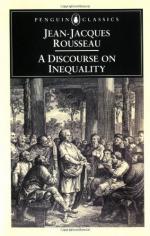
|
| Name: _________________________ | Period: ___________________ |
This test consists of 5 multiple choice questions, 5 short answer questions, and 10 short essay questions.
Multiple Choice Questions
1. What is Rousseau's biggest worry when discussing the correlation between the restoration of the arts and sciences in?
(a) To be selective in his research.
(b) It is difficult to treat the subject properly.
(c) To not be objective.
(d) That he will not explain it.
2. What type of rights does Rousseau want the cities in his State to have?
(a) To make war.
(b) To vote.
(c) To make laws.
(d) To make peace.
3. What does Rousseau say arts require?
(a) Talent.
(b) Power.
(c) Passion.
(d) Luxury.
4. The arts and sciences have helped human beings to repress what according to "Chapter 1, A Discourse on the Moral Effects of the Arts and Sciences, Part I"?
(a) Their kindness.
(b) Their narcissism.
(c) Their wickedness.
(d) Their infatuation.
5. What does Rousseau believe ensures wicked doctrines corrupting life forever?
(a) Art and artists.
(b) The printing press.
(c) War.
(d) History.
Short Answer Questions
1. Why does Rousseau think men lie under restraint?
2. What was the result of the arts and sciences becoming despotic, according to Rousseau?
3. How do modern centuries see natural law?
4. What type of government worries Rousseau?
5. What does Rousseau exhort his citizens NOT to do?
Short Essay Questions
1. Discuss what the results of growth of words had on society, according to Rousseau in "Chapter 4, A Discourse on the Origin of Inequality, Part One".
2. Describe what amore-propre is, according to Rousseau.
3. Explain how Rousseau feels about knowledge as described in "Chapter 3, A Discourse on the Origin of Inequality, Dedication and Preface".
4. What does Rousseau feel humans are called to, according "Chapter 6, A Discourse on the Origin of Inequality, Appendix"?
5. What is the main task of "A Discourse on the Origin of Inequality"?
6. Explain what Rousseau suggests about mankind's living quarters in their earliest stage.
7. Discuss what "Chapter 5, A Discourse on the Origin of Inequality, Part Two" says about despotism role in inequality.
8. What is the general will composed of, according to "Chapter 7, A Discourse on Political Economy"?
9. What does Rousseay describe the "social man"as?
10. What are the effects of idleness on humanity, according to "Chapter 2, A Discourse on the Moral Effects of the Arts and Sciences, Part II"?
|
This section contains 726 words (approx. 3 pages at 300 words per page) |

|




